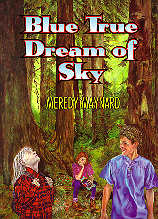


|
Blue True Dream of Sky.
Meredy Maynard.
Subject Headings:
Grade 5 - 9 / Ages 10 - 14. *** /4 Note: Book was reviewed from page proofs. |

excerpt:
The light is just creeping in and Calvin realizes it is no longer completely dark. It's like watching a slow sunrise when the sky is thickly overcast. He cannot begin to fathom where he is or what has happened, and decides he must be dreaming. All he can see is this dense fog which swirls and moves around him. His body is weightless, floating as if in outer space. Time has ceased its perpetual movement. It is peaceful in a way, but for this aching silence, which makes him wonder if he might be the last person alive on earth. Where is everyone?
The book's unusual title is taken from a poem of gratitude, i thank you God for this amazing, by e.e. cummings, but Nicola "Nickie" Angel, 14, finds little to celebrate in her life in Weldon Sound, a Pacific coast logging community. Three months previously, her 16-year-old brother, Calvin, had been in a car accident which left him in a coma with no guarantee of recovery. Shortly before the accident, Calvin and his father had argued with their conflict being rooted in differing values regarding logging. Mr. Angel had worked his entire life for McDougal Brown, a multinational company which held logging rights to most of the Sound and which employed, directly or indirectly, the majority of the area's inhabitants; whereas Calvin, an emerging environmentalist, opposed the company's devastating clear-cutting practices in the temperate rain forest.
After the accident, Nickie's father became distant and angry, her mother retreated to her room, and only Nickie continued almost daily hospital visits to her comatose brother. Nickie finds herself having to take sides when the government grants McDougal Brown logging rights on Macquet Island despite unresolved native land claims. Appropriate to the YA genre, Nickie's dissent finds personal, as opposed to just altruistic, expression. Growing up, she and Calvin used to play on the island, and they identified with two giant Red Cedars, brother and sister trees. With Calvin's precarious health, Nickie believes she must protect "their" trees. A further complication involves Nickie's meeting and becoming attracted to newcomer, Jeff, about 15 and the son of a leader of an "outside" environmental group.
Maynard's writing, while offering lots of conflict plus good characterization, correctly avoids providing middle school readers with a "correct answer", simplistic solution to the story's complex environmental theme. A subplot involves Nickie's violin playing attempts to penetrate her brother's coma. At the end of many chapters, Maynard utilizes a reader engaging stylistic device wherein she incorporates the thoughts of the comatose Calvin.
A good companion read to William Bell's Speak to the Earth.
Recommended.
Dave Jenkinson teaches children's and adolescent literature courses at the Faculty of Education, University of Manitoba.

To comment on this title or this review, send mail to cm@umanitoba.ca.
Copyright © 1997 the Manitoba Library Association. Reproduction for personal use is permitted only if this copyright notice is maintained. Any other reproduction is prohibited without permission.
Published by
The Manitoba Library Association
ISSN 1201-9364
TABLE OF CONTENTS FOR THIS ISSUE - APRIL 25, 1997.
AUTHORS | TITLES | MEDIA REVIEWS | BOOKSHELF | BACK ISSUES | SEARCH | HOME